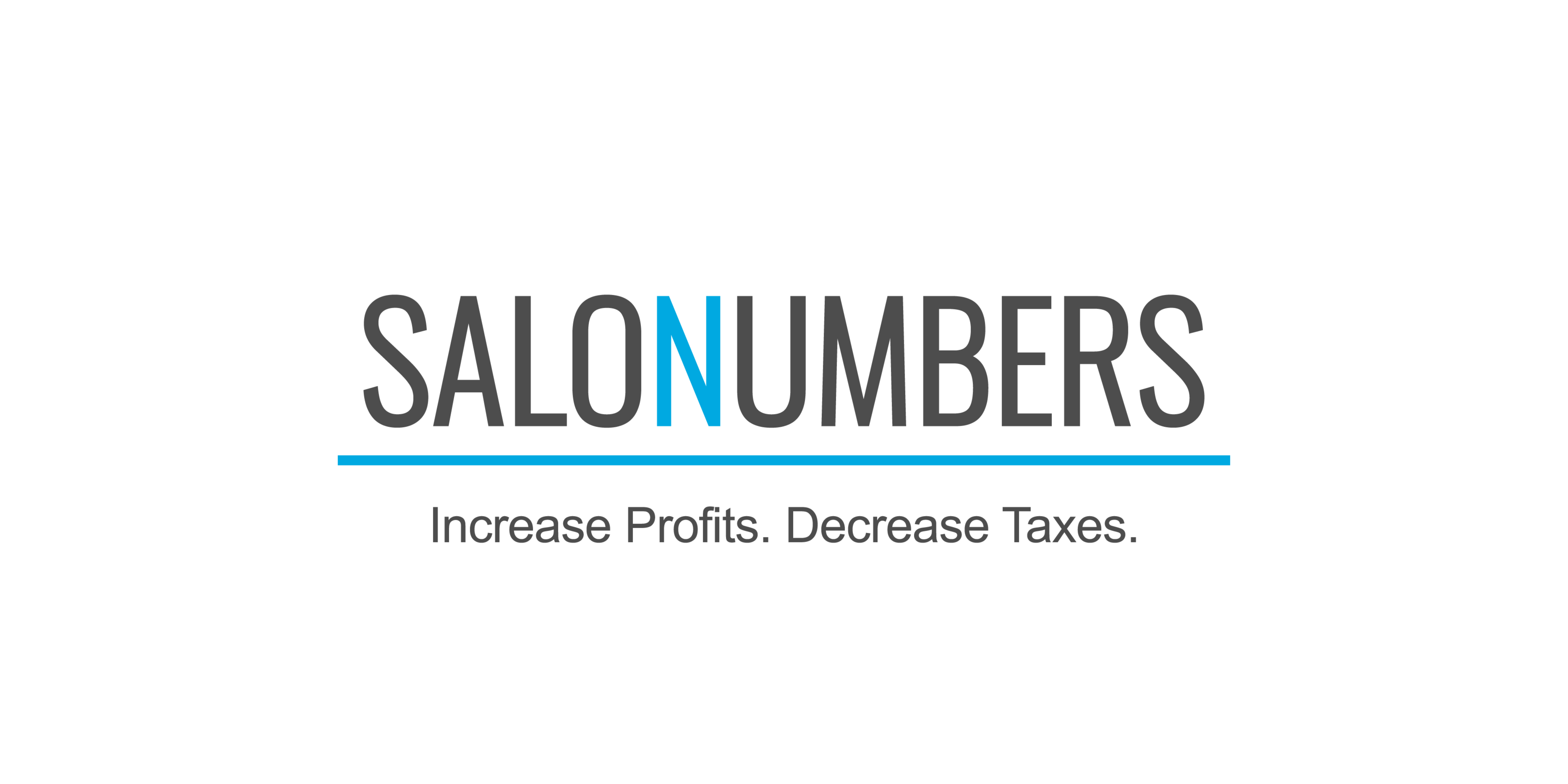Welcome to Salonumbers
Increase Profits. Decrease Taxes. Exclusively Salons.
Salon Owners should focus on their craft—not accounting and tax strategy. At Salonumbers, we help you boost profits and reduce taxes, so you can do what you do best. We're here to support your success.

Who Are We?
Tax Experts, Strategists, and Advisors.
Partnering with an Accounting Advisor who specializes in successful businesses and accredited investors can be the key to thriving—not just surviving—in today’s competitive economy.
With years of experience supporting individuals and growing businesses, we’ve developed premier Accounting Advisor programs designed to do more than crunch numbers. We deliver real solutions to the financial challenges salon owners face every day.
Why Choose Us?
Expert Accounting Solutions You Can Trust
We specialize in helping salon owners keep more of what they earn and grow with confidence. Our team of accounting and tax experts delivers salon-specific strategies that reduce your tax burden and increase your profits—so you can focus on what you do best: running your salon and serving your clients.
From accounting and tax prep to high-level financial guidance and back-office support, we handle the financial details, so you don't have to. Whether you're a solo stylist or managing a full team, Salonumbers is your trusted partner—offering personalized support, industry insight, and smart financial solutions that help your business thrive.
Industry Expertise: We understand the unique needs of salons—because we work exclusively with salon professionals.
All-in-One Support: From taxes and payroll to business planning, we’ve got you covered.
Tailored Strategies: Your salon is unique—your financial plan should be too.
Proven Success: We’ve helped salons nationwide grow stronger, smarter, and more profitable.

Let Salonumbers take care of the numbers,
so you can take care of your clients.
Custom Salon Packages
Whether you own a beauty school, wellness spa, or single salon, we have what you need.

Boost Cashflow
With careful analysis and detailed financial reporting, our team of experts will provide actionable recommendations to maximize your cash flow. Whether it's optimizing expenses, streamlining operations, or identifying new revenue opportunities, we tailor our strategies to your unique business needs.

ProfitPoints Financials
Our custom financial statements, expert bookkeeping, and accounting services provide you with valuable insights that help optimize your business’ bottom line. We go beyond the numbers, offering strategies and advice that improve efficiency and profitability. Let us handle the details, so you can focus on growing your business!

Golden Scissors
We help you build a Stylist Retention System that keeps your top talent engaged and reduces costly turnover. At the same time, we guide you in creating a personalized Owner Retirement and Exit Plan that supports your long-term financial goals. Together, we help you secure both the future of your team and the legacy of your salon.

Salon ProActive Taxes
Our team offers comprehensive tax advisory services, including expert tax preparation, to ensure you save more and stay compliant. From strategic tax planning to year-round support, we tailor our services to your specific needs, helping you keep more of what you earn while staying ahead of any tax changes.

CFO On Demand
We offer innovative solutions and provide valuable insights into both your business and personal accounting. Our team delivers the expertise and support you need to make informed financial decisions, ensuring you get the maximum value from your finances. Let us help you unlock new opportunities for growth and efficiency!

PaycraftHR Payroll
We offer fully customized payroll processing, ensuring compliance with all regulations while providing detailed labor insights and reporting. Our services help you manage your workforce more effectively, reduce administrative burdens, and stay compliant with payroll regulations. Let us handle the complexities, so you can focus on growing your business.
Meet our Founder
Financial Stability for Your Peace of Mind

Nicholas Secord, MBA, CAA CEO / Executive Financial Partner
OUTSOURCE CFO & TAX EXPERT
Having an Accounting Advisor who exclusively works in the salon and spa industry can mean the difference between surviving and thriving in the ever-competitive beauty industry.
With years of experience working with salons and spas, we have created premiere Accounting Advisor programs that provide you with more than just numbers- we give you solutions to your salons’ most pressing problems.
What our Clients are Saying
WIth proven results to increase your profit, decrease your taxes, we have helped the top salons in the nation.

The accounting services provided by this firm have been exceptional. Their expertise and attention to detail have significantly improved our financial management. Highly recommend!

Matthew G.
Beauty School Owner

Salonumbers took the stress out of finances. Their expert support and tax strategies boosted our profits and gave us peace of mind. So glad we made the switch!

Kristin W.
Wellness Salon Owner

Before Salonumbers, tax season was chaos. Now, we have clean books, clear strategy, and a team that truly cares. They’ve been key to our growth.

Ryan F.
Barber Shop Owner
Looking to Give Back in the Salon Industry?
We can show you how to contribute to charities such as the one below, and learn the tax benefit it will provide!
Doing good never looked so easy!

Did you know your salon can make a powerful impact and benefit financially through charitable giving?
We’re proud to support HairToStay, a nonprofit that helps low-income cancer patients afford scalp cooling treatments—reducing hair loss during chemotherapy and preserving dignity through a difficult journey. As a salon owner, supporting causes like HairToStay not only aligns with the heart of this industry—it can also offer valuable tax benefits.
Want to explore the tax benefits to charitable contributions?
Visit their website or click the link below to find out how you can help their cause TODAY: www.hairtostay.org
Let’s do good, and make it count.
Contact Us
8470 Enterprise Circle Ste 110
Lakewood Ranch, Florida 34202
(727) 362-6858
